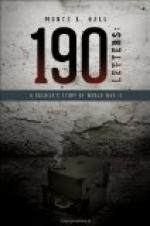October 28.
This is nearly the end of the third month of a terrible trial, from which the lessons will be wide and salutary not only to him who will know how to listen, but to all the world, and therein lies the great consolation for those who are involved in this torment. Let it also be the consolation of those whose hopes are with the combatants.
This consolation consists especially in the supernaturally certain conviction that all divine and immortal energy, working through mankind, far from being enfeebled, will, on the contrary, be exalted and more intensely effectual at the end of these storms.
Happy the man who will hear the song of peace as in the ’Pastoral Symphony,’ but happy already he who has foreknowledge of it amid the tumult! And what does it matter in the end that this magnificent prophecy is fulfilled in the absence of the prophet! He who has guessed this has gleaned great joy upon earth. We can leave it to a higher being to pronounce if the mission is accomplished.
October 28 (2nd letter, almost at the same hour).
MY DEAR, DEAR MOTHER,—Another welcome moment to spend with you. We can never say any but the same thing, but it is so fine a thing that it can always be said in new ways.
To-day we are living under a sky of great clouds as swift and cold as those of the Dutch landscape painters.
* * * * *
Dear, I dare not wish for anything—it must not be. I must not even consider a partial relaxation. I assure you that the effort for endurance is less painful than certain times of intensive preparation that we have passed through. Only we can each moment brace ourselves in a kind of resistance against what is evil in us, and leave every door open to the good which comes from without.
. . . I am glad that you have read Tolstoi: he also took part in war. He judged it; he accepted its teaching. If you can glance at the admirable War and Peace, you will find pictures that our situation recalls. It will make you understand the liberty for meditation that is possible to a soldier who desires it.
As to the disability which the soul might be supposed to suffer through the lack of all material well-being, do not believe in it. We lead the life of rabbits on the first day of the season’s shooting, and, notwithstanding that, we can enrich our souls in a magnificent way.
October 30.
I write to you in a marvellous landscape of grey autumn lashed by the wind. But for me the wind has always been without sadness, because it brings to me the spirit of the country beyond the hill. . . .
The horrible war does not succeed in tearing us from our intellectual habitation. In spite of moments of overwhelming noise, one more or less recovers oneself. The ordinary course of our present existence gives us a sensibility like that of a raw wound, aware of the least breath. Perhaps after this spoliation of our moral skin a new surface will be formed, and those who return will be for the time brutally insensitive. Never mind: this condition of crisis for the soul cannot remain without profit.




